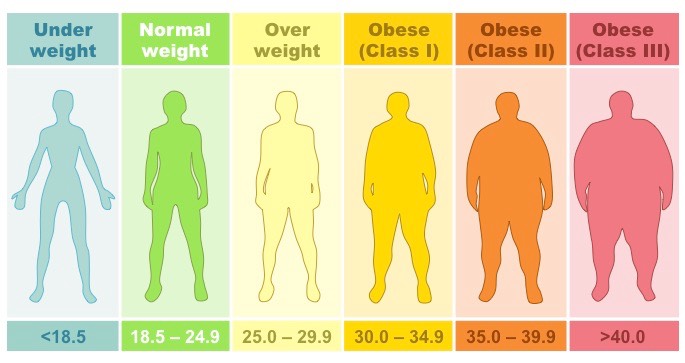Becoming overweight should be avoided by everyone. But for persons with disabilities becoming overweight is a strict NO! Those extra kilos on your body can make you even more disabled. Increased weight will not just hamper your mobility, but also it will cause problems to your bones and muscles. And then those risks of diabetes, hypertension and stroke etc. are also there to cause problems.
You can always keep an eye on your weight by regularly using a weighing machine. But how exactly would you know whether your weight is within normal limits? How would you know if you’re overweight or obese? Well, Body Mass Index (BMI) is one of the globally accepted standard of defining obesity. Today, we will know more about BMI.
What is BMI?
Body Mass Index or BMI is a measure that is calculated from a person’s height and weight. Definition of BMI is:
The BMI is defined as the body mass divided by the square of the body height, and is universally expressed in units of kg/m2, resulting from mass in kilograms and height in metres.
BMI value is used to categorize a person as underweight, normal weight, overweight or obese.
WeCapable has developed a free online BMI calculator that takes your weight (in kilograms or in pounds) and height (in centimeters or inches) as input and calculates BMI value for you. It also interprets the BMI value as per the WHO standards to informs you if you are underweight, normal weight, overweight or obese.
Formula to Calculate BMI
If you’re using the metric measurement system, formula for BMI calculation would be:
BMI = Weight in Kilograms / (Height in Meters) x (Height in Meters)
And if you’re using the Imperial system of measurement, formula for BMI calculation would be:
BMI = ( Weight in Pounds / (Height in inches) x (Height in inches) ) x 703
BMI value is universally calculated and expressed in metric measurement (kg/m^2). When pounds and inches are used, the value is multiplied by the conversion factor of 703.
BMI Classification
The following table gives the classification of BMI value as decided by the WHO:
| Category | BMI (kg/m2) | BMI Prime | ||
|---|---|---|---|---|
| from | to | from | to | |
| Very severely underweight | 15 | 0.60 | ||
| Severely underweight | 15 | 16 | 0.60 | 0.64 |
| Underweight | 16 | 18.5 | 0.64 | 0.74 |
| Normal (healthy weight) | 18.5 | 25 | 0.74 | 1.0 |
| Overweight | 25 | 30 | 1.0 | 1.2 |
| Obese Class I (Moderately obese) | 30 | 35 | 1.2 | 1.4 |
| Obese Class II (Severely obese) | 35 | 40 | 1.4 | 1.6 |
| Obese Class III (Very severely obese) | 40 | 45 | 1.6 | 1.8 |
| Obese Class IV (Morbidly Obese) | 45 | 50 | 1.8 | 2 |
| Obese Class V (Super Obese) | 50 | 60 | 2 | 2.4 |
| Obese Class VI (Hyper Obese) | 60 | 2.4 | ||

Why is BMI Important
BMI value is nowadays considered a benchmark for deciding if a person is overweight. It is very important to know status of one’s weight because a lot of other medical conditions have a relation with obesity. A weighing machine can tell us our weight — but we need BMI value to put the weight in right category.
If your BMI value is high, especially if it says that you’re obese, you should be very careful about your health. You must try to shed those extra kilos asap.
We have published articles on physical exercises that are suitable for wheelchair users. You can always find some exercises that you can do irrespective of your disability.
So, go ahead and calculate your BMI value with our calculator and take appropriate measures if your weight is not normal. Stay connected with WeCapable!
Use the citation below to add this article to your bibliography
"Body Mass Index (BMI): Calculation and Importance." Wecapable.com. Web. May 30, 2025. <https://wecapable.com/body-mass-index-bmi-importance/>
Wecapable.com, "Body Mass Index (BMI): Calculation and Importance." Accessed May 30, 2025. https://wecapable.com/body-mass-index-bmi-importance/
"Body Mass Index (BMI): Calculation and Importance." (n.d.). Wecapable.com. Retrieved May 30, 2025 from https://wecapable.com/body-mass-index-bmi-importance/

Heigth 157 centimeters=1.57
Square of heigth: (1.57×1.57)m
=2.46m
Weigth:40 kilograms
BMI=weigth=40
heigth=2.46 =16.26
BMI= 53kg
——–
5’2 = 10.6 x 2= 21.8
normal weight
11_Bernardino, Daniel R. 7-Andrew
17.8
Underweight
BMI
WEIGHT:49kg
Height:1.52 m
2.3104
1.52 % 49
=21.208448753462 kg/m
60 ÷ (1.62 × 1.62) =
60 ÷ 2.6244 = 22.8623685414 or 22 (normal weight)
weigth=30kg
heigth=5.3 m2
5.3x
5.3
2.65
30divide 2.65
11.3kg m2
20.8
BMI= 45kg/1.52m
BMI= 18.1
weight: 50kg
Height: 1. 62m
BMI=
Weight in kg/(height in m)x (height in m)
=50kg/(1.62m)
=19.05